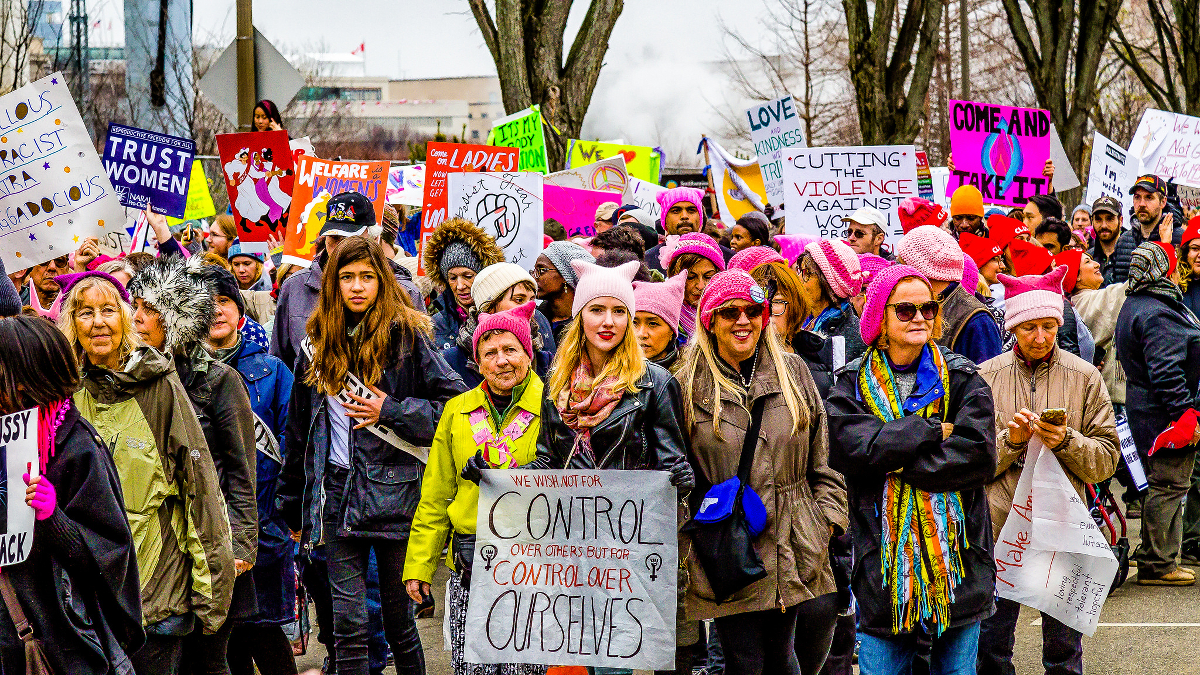The radical socialist roots of International Women’s Day—which falls this year on Wednesday, March 8—have troublingly given way to a corporate-sponsored “holiday” that has its own depoliticized hashtag. More troublingly, however, is how this depoliticization works to exclude the very women who should be included and celebrated on a day that is, ostensibly, meant for “all women.” The IWD campaign for 2017 encourages participants to “be bold” in going up against systems and attitudes that have held women back. For women who have been left out by mainstream feminism, however—such as women of color, disabled and chronically ill women, trans women, lesbian and queer women, gender nonconforming (GNC) women, and low-income women—“being bold” might have a very different meaning, and one that is at odds with more mainstream feminism.
Celebrating the contributions of women who have traditionally been left behind by the feminist movement—and progressive movements in general—is particularly important in a climate where the current U.S. presidential administration is gleefully rolling back the rights and gains of transgender people, immigrants, Muslims, women who utilize the services of Planned Parenthood, and people with disabilities. The feminist movement’s numerous issues with racism, transphobia, and ableism have been well documented—particularly in the age of social media, where “talking back” via Twitter, Tumblr, and other platforms is, theoretically, easier than ever–but mainstream feminism has been resistant to change. Those of us on the “outside” of the mainstream women’s movement have seen this resistance to inclusion and change most recently at (and around) the January 21st Women’s March events. As writers Sam Riedel and Philippa Willitts have documented, the Women’s March and the behavior of some of its participants were “empowering” for many women, but at the direct expense of marginalized women.
This year’s IWD has further significance thanks to a few prominent academics and activists who, writing in the Guardian in February, called for a “general strike” on March 8 to fight directly against both Lean In-style corporate feminism and the Trump administration’s “aggressively misogynistic, homophobic, transphobic and racist policies.” The authors of this piece call for women to “take to the streets,” without considering that there are a number of factors that might prevent more marginalized women from doing so. Are you disabled, living with an unpredictable chronic illness, at risk for deportation or law enforcement harassment, a sex worker, GNC or trans but not publicly “out” yet, or working at a hand-to-mouth job with limited days off? Whoops—the Women’s Strike platform must have forgotten to include you. The Women’s March organizers have posted a statement supporting this strike, but also urge strikers to support the Women’s March-approved #DayWithoutAWoman demonstrations.
The platform on the Women’s Strike website, like that of the IWD site’s #BeBold page, attempts to be inclusive, but in doing so seems to elide many of the huge differences among women in trying to spread an idea of common “sisterhood” that connects all of us—and for which, in the platform’s logic, we should all be fighting/marching. The Strike platform connects the minutiae of women’s lives with some of the bigger issues, noting that March 8 supporters will be “[striking] from paid jobs, emotional labor, childcare, diapers, housework, cooking […] errands, groceries, fake smiles, flirting, makeup, laundry, [and] shaving,” and “[striking] for an end to racist and sexual assaults, and all forms of bigotry, reproductive freedom, full access, and no coercion, national health care for all, a $15 minimum wage for all workers […] protection and expansion of Social Security, [free] childcare […], paid family leave, [and] R-E-S-P-E-C-T.”
Unfortunately, there is no attempt to connect the Strike Platform’s demands to the ways in which these things will impact women on the margins of U.S. society—many of whom have been (and will continue to be) further marginalized by the Trump administration. National health care and the current efforts to dismantle the Affordable Care Act (ACA) are disability issues, as is the “protection and expansion of Social Security.” An end to sexual assault and the shoring up of reproductive freedom—without coercion—are issues that affect women with disabilities, sex workers, trans women, and GNC women alike. The fight for a $15 minimum wage has high stakes for low-income women and those who work hand-to-mouth jobs. Yet there is zero attempt made in the Women’s Strike Platform to connect these wider issues to the very women who are most affected.
Certainly, such general language has a place in feminism and feminist activism, particularly for beginner feminists. However, as the many problems with intersectionality—or lack thereof, as Global Comment’s Philippa Willitts outlined recently—that the Women’s March platform had, it may be time to move beyond the Feminism 101-style language that has characterized 2017’s mass feminist activism. The concepts and best practices behind intersectionality can be made accessible to many. Like listening to and fully including marginalized women in mass feminist protests and actions, this takes work, but it can be done.
Further, there is no good reason that a mass movement that is pro-women’s rights and feminism should leave behind the most marginalized women in favor of gains for the middle-class, educated, cisgender, and/or nondisabled majority. Whether the International Women’s Day and Women’s Strike organizers intend to or not, the leaving out of women with disabilities, women of color, sex workers, trans women, queer women, and low-income women simply repeats the mistakes that more mainstream feminist movements have made over and over again. We are right here, and many of us want to support your movement—but we can’t support a movement that keeps pretending that we do not exist.
Photo: Mobilus in Mobili/Creative Commons

